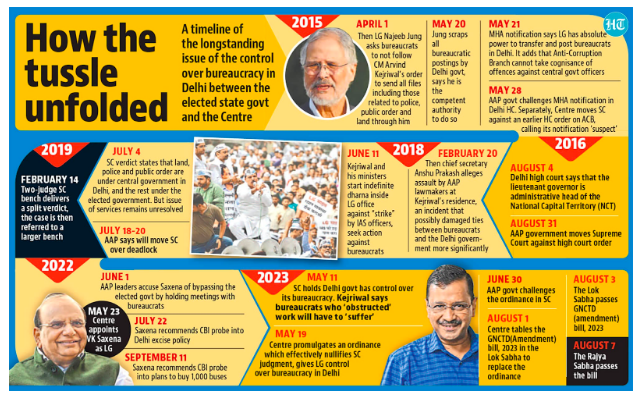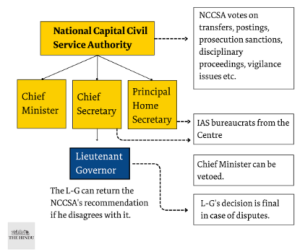Context:
Recently, the Government of National Capital Territory of Delhi (Amendment) Bill, 2023 was passed by Parliament.
More on News:
- Once it becomes law, it will redefine the roles of the elected government, the Lieutenant Governor (L-G), and the state’s administrative machinery.
- The bill also hands more powers to Delhi’s bureaucrats.
| PYQ:
Q. Whether the Supreme Court Judgment can settle the political tussle between the Lt. Governor and elected government of Delhi? Examine. (2018) |

Timeline on Key Legislations and Judgements on Delhi:
| Year |
Development |
| 1956 |
- States Reorganization Act is passed. Delhi classified as a Union Territory
|
| 1991-92 |
- The 69th Constitutional Amendment (Article 239AA) is passed to make Delhi a UT with legislature.
- The Government of National Capital Territory of Delhi (GNCTD) Act, 1991 is passed.
- The 70th Constitutional Amendment is passed which provides for certain laws of Parliament (amending Article 239AA) to not be deemed as an amendment to the Constitution.
|
| 2015 |
- The Ministry of Home Affairs issues a notification taking away the control over services from the Delhi legislature, and empowering the LG to discharge functions of the Central Government in relation to the same.
|
| 2016 |
- Delhi High Court holds that services lie outside the purview of the Delhi legislative assembly and executive.
|
| 2018 |
- The Supreme Court rules that the LG must act on the “aid and advice” of the council of ministers of Delhi.
|
| 2019 |
- A two-judge bench of the Supreme Court delivers a split verdict while ruling over the issue of services.
|
| 2021 |
- The Union government amended the GNCTD Act, 1991, expanding the list of matters where the LG’s opinion was mandatory and the nature of Bills that LG could refer to the President.
|
| 2023 |
- The Supreme Court ruled that the Delhi government has control over services in Delhi.
- Central government promulgates an Ordinance to amend the GNCTD Act, 1991 to exclude “services” from the purview of Delhi legislature.
- The GNCTD (Amendment) Bill, 2023 was passed in both houses to replace the Ordinance.
|
Need of the Bill:
- Maintaining Democratic and Administrative Balance: The need for the Government of National Capital Territory of Delhi (Amendment) Bill is stated as maintaining democratic and administrative balance in governing Delhi.
- Ensuring Corruption-Free and Pro-People Governance: The central government asserts that the aim is to ensure corruption-free and pro-people governance.
- Preventing State Government Interference: It seeks to prevent state government interference in central powers.
Key Features of the Bill:

- National Capital Civil Services Authority (NCCSA): The Bill creates the NCCSA to advise Delhi’s Lieutenant Governor on specific service-related aspects, such as transfers, vigilance, discipline, and prosecution for Group A officers of All India Services (excluding Indian Police Service) and DANICS.
- Powers of the Lieutenant Governor:
- The Bill empowers the LG to exercise his sole discretion on several matters including those recommended by the National Capital Civil Services Authority, and the summoning, prorogation and dissolution of the Delhi Legislative Assembly.
- If a disagreement arises between the LG and the Authority, the LG’s decision will hold ultimate authority.
- Duties of Secretaries:
- It authorizes department secretaries to bring to the notice of the LG, the Chief Minister and the Chief Secretary any matter that may bring Delhi Government into controversy with the Central Government.
| The GNCTD (Amendment) Ordinance, 2023 |
Changes in the 2023 Bill |
- Delhi’s legislative competence over services removed.
|
|
- Power to appoint authorities, boards, commissions, statutory bodies, or office bearers will lie with the President under any law.
|
- Power to appoint authorities, boards, commissions, statutory bodies, or office bearers will lie with: (i) the President for any law of Parliament, and (ii) LG for any law of Delhi legislature.
|
- The Civil Services Authority to submit an annual report to the central government and Delhi government, which will be tabled in Parliament and the Delhi Legislative Assembly.
|
|
- Any matter of administrative importance which the President or the Delhi Chief Minister may consider necessary will be submitted to the LG prior to the issue of any order.
|
- Any matter of administrative importance which the Delhi Chief Minister may consider necessary will be submitted to the LG prior to the issue of any order.
|
Verdict of the Supreme Court (2023): GNCTD vs Union of India cases
- Power to the Elected Government: Elected governments should control administration, including officers recruited regardless of their affiliations.
- Civil servants are impartial professionals serving the public, not parties.
- The National Capital Territory of Delhi (NCTD) would not have the power to legislate on public order, police and land.
- Legislative and Executive Control over Civil Services: Legislative and executive power over services such as Indian Administrative Services or Joint Cadre services, shall lie with Delhi Government.
- Principle of Triple Chain of Collective Responsibility: The Supreme Court said a principle of “triple chain of collective responsibility” existed in the governance of the capital.
- This three cornered command included civil service officers being accountable to Ministers, who are in turn accountable to the Parliament/Legislature, which is ultimately answerable to the electorate.
- Interpretation of Article 239AA: The SC interpreted Article 239AA, the provision that deals with the governance structure of Delhi, as one that underlies the principles of federalism, participatory democracy, and collective responsibility.
-
About Article 239AA of the Constitution:
- It was inserted into the Constitution by the 69th Amendment Act, 1991.
- It conferred special status on Delhi following the recommendations of the S Balakrishnan Committee.
- The Legislative Assembly shall have the power to make laws for the NCT with respect to any of the matters in the State List or Concurrent List except on the subjects of police, public order, and land.
|
Concern with the Bill:
- Triple Chain of Accountability Concerns: Conferring powers over the transfer and posting of officers to the Authority may break the triple chain of accountability that links the civil services, ministers, the legislature and citizens.
- This may violate the principle of parliamentary democracy, which is a part of the basic structure doctrine.
- Discretion of the LG: The LG has been granted sole discretion in several matters including when the Legislative Assembly will convene.
- This implies that the Chief Minister may be unable to convene a session needed for essential government business.
- Bypassing Ministerial Involvement: Department secretaries will bring certain matters directly to the LG, Chief Minister and the Chief Secretary, without consulting the concerned minister.
- This may go against the collective responsibility of the Cabinet, as the concerned ministers cannot provide his inputs.
Conclusion:
In the process of resolving the situation, it’s crucial for everyone involved to show dedication to constitutional principles. This includes valuing democratic governance, the division of powers, and the rights of elected officials. Adhering to the constitutional framework will establish a strong basis for a just and clear resolution.
Administration of UT in India:
- Part VIII (Articles 239 to 241) of the Constitution deals with the Union Territories.
- UTs are administered by the President through an administrator appointed by him/her.
- In some UTs, such as Delhi and Puducherry, the administrator holds significant powers, including the ability to make laws and regulations for the UT.
- In other UTs, such as Lakshadweep and Dadra and Nagar Haveli, the administrator’s powers are limited to providing advice to the elected government.
- Special Provisions for Delhi and Puducherry:
- The Union Territories of Puducherry (in 1963), and Delhi (in 1992) are provided with a legislative assembly and a Council of Ministers headed by a Chief Minister.
- The Legislative assembly of Puducherry may make laws with respect to matters enumerated in List II or List III in the Seventh Schedule of the Constitution.
- The National Capital Territory of Delhi also has these powers. However, some entries in List II, such as public order, police, and land, are not within the legislative competence of the legislative assembly of Delhi.
|
News Source: The Hindu
![]() 10 Aug 2023
10 Aug 2023

